-
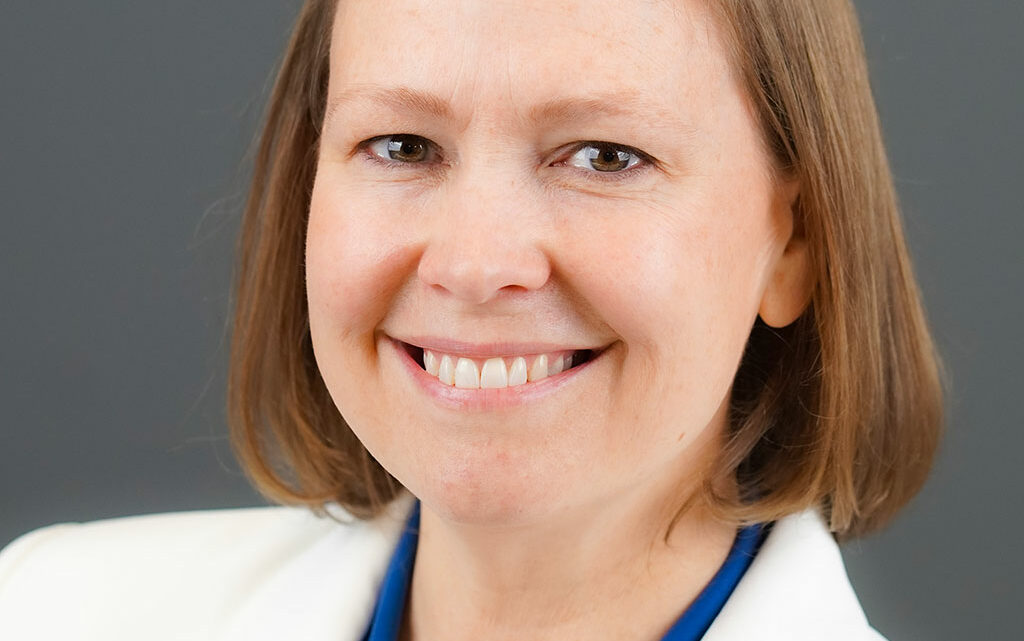
February 19, 2026 Melissa Morris Named Associate Director of Education for Mid-America Union Conference
Read more -

February 17, 2026 Kansas-Nebraska Member’s Plant-Based Cookbook Featured on 3ABN Cookbook Offers Healthy, Plant-Based, and Gluten-Free Recipes
Read more -
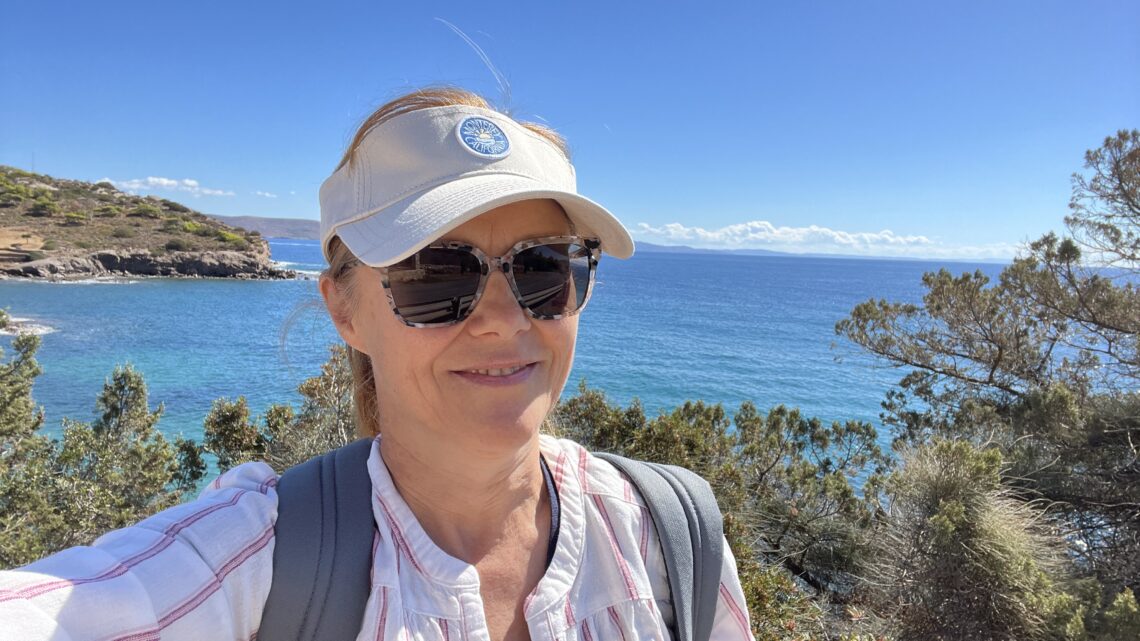
February 16, 2026 Living the Language For nine months, Dr. Toews is experiencing Biblical Greek in its original context. She is already passing on new insights to students.
Read more
Adventist News
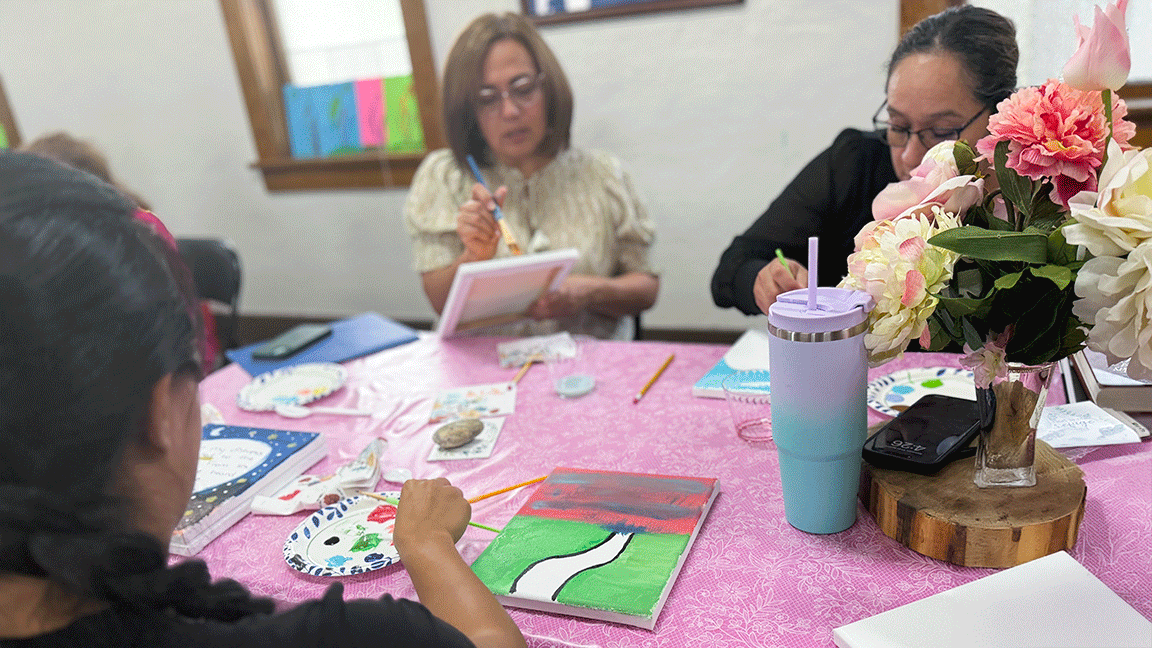 Fort Morgan Church Hosts Women for “Faith and Purpose” Event
RMCNews – February 23, 2026
Fort Morgan Church Hosts Women for “Faith and Purpose” Event
RMCNews – February 23, 2026
The Fort Morgan Church in Fort Morgan, Colorado, hosted a women’s gathering centered on the theme “Faith and Purpose” last August. It was a powerful time of connection, growth and encouragement for those who attended. “We had a great turnout of ladies of all ages—including young women—from Fort Morgan, Akron, and Sterling coming together as one community to uplift and inspire one another in faith,” remarked an event coordinator. She continued, “Special guests, Gabriel Camacho and Bella Cinco, shared timely and powerful messages that spoke directly to the hearts of the women in the room. Their words reminded us to trust God’s plan and boldly walk in our purpose.” The event included interactive exercises and reflections that helped attendees explore their personal journeys of faith and discover new strength in their purpose. It was a space of vulnerability, joy and sisterhood. Attendees also shared a delicious meal together, and every woman received a thoughtful gift as a reminder of her worth and identity in Christ. The atmosphere was filled with warmth, laughter and meaningful conversation. The event coordinators send a heartfelt thank you to every woman who came, every volunteer who served, and the churches of Fort Morgan, Akron and Sterling for their presence and support. This gathering was a success because of their hearts, their faith and their willingness to show up for one another. We believe this is only the beginning—and greater things are still to come! Waleska Agramonte is the wife of Gabriel Agramonte, lead pastor of the Fort Morgan District, and Katie Paca is the Fort Morgan Church’s women’s ministries director.
Read more...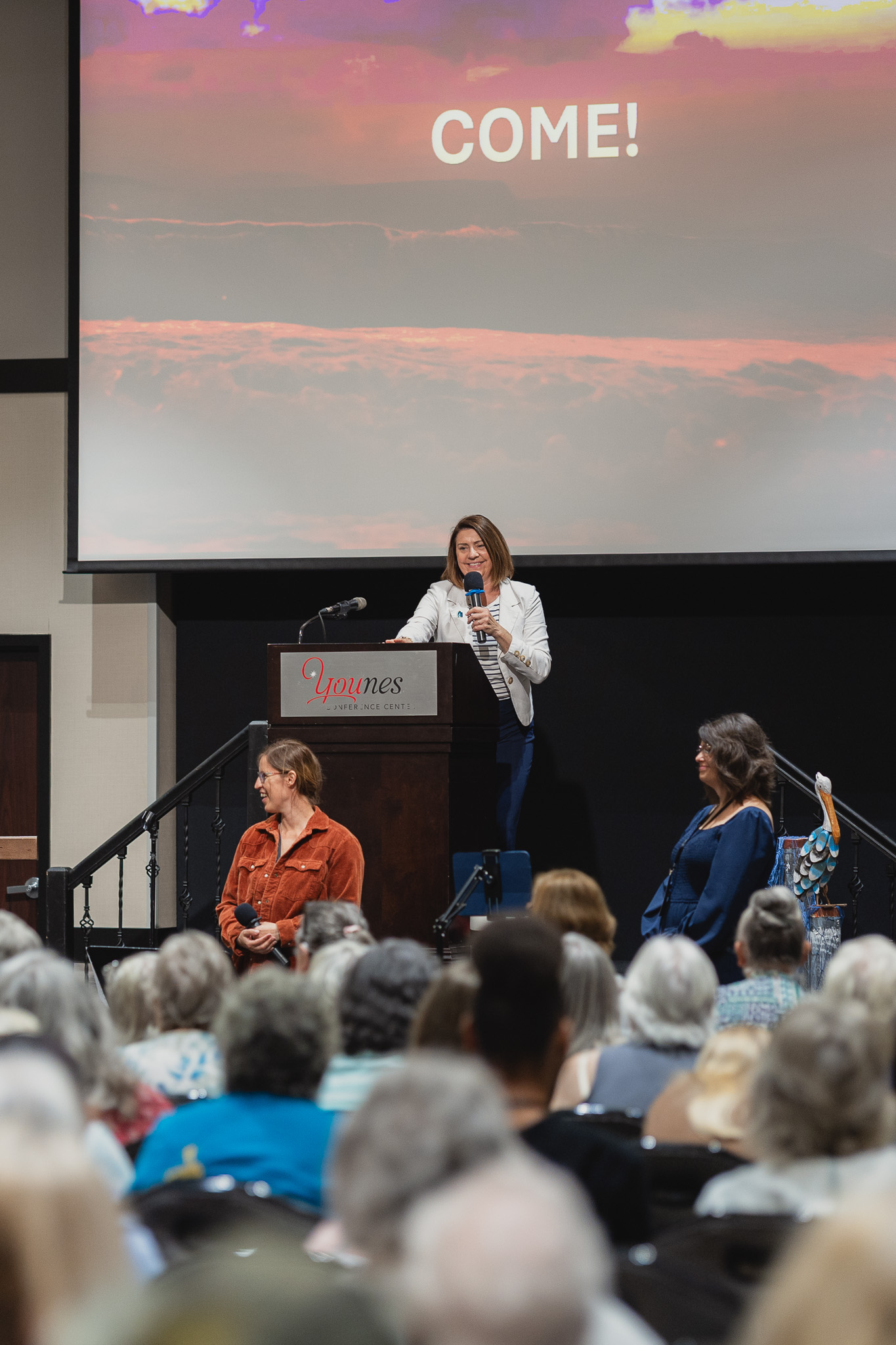 Kansas-Nebraska’s 2025 Women’s Retreat Focuses on Being “Anchored in Christ” Attendees return home renewed and inspired
Saul Dominguez – February 23, 2026
Kansas-Nebraska’s 2025 Women’s Retreat Focuses on Being “Anchored in Christ” Attendees return home renewed and inspired
Saul Dominguez – February 23, 2026
Last October, women from across our conference gathered in Kearney, Nebraska, for a memorable women’s retreat. With open hearts and eager spirits, we came together for a weekend of worship, learning and fellowship, all centered around this year’s theme: “Anchored in Christ.” Hebrews 6:19 reminds us that “We have this hope as an anchor for the soul, firm and secure.” Throughout the weekend, we experienced how God’s presence anchors our hearts, helping us trust Him more fully and find peace in His promises. Whether worshiping, attending seminars or encouraging one another, the Holy Spirit filled every moment with love and peace. The retreat offered a beautiful balance of inspiration and refreshment. Uplifting music lifted our hearts in worship, and morning exercise energized us for the day. Seminars and breakout sessions encouraged growth both spiritually and practically, while Saturday night’s creative craft activity brought laughter, connection and good memories. Our main speaker, DeeAnn Bragaw, shared powerful messages reminding us that, just as pearls are formed through pain, God uses storms and challenges to shape something beautiful within us. Many women shared how God is gently calling them to deepen their faith and walk closer with Him. We also reflected on the importance of surrender and forgiveness, letting go of burdens, forgiving ourselves and others, and trusting that God’s love and grace are greater than our struggles. Spending time in God’s Word was highlighted as essential for staying Anchored in Christ, giving us strength and confidence to face life’s storms. Hearing personal testimonies reminded us of the power of sharing our stories, encouraging one another, and building meaningful fellowship. One participant shared, “My sisterhood experience was awesome. No matter what storm I face, God is already there, holding out His hand to walk me through it.” Another reflected, “Life is different now—by letting Jesus be a real presence in my life, He carries the burdens I used to bear and helps me with my struggles.” The retreat left us renewed and inspired, with hearts ready to stay rooted in Scripture, walk in forgiveness, encourage one another, and remain Anchored in Christ. We praise God for His presence, for the friendships formed, and for a weekend that reminded us that the hope we have in Jesus is truly “firm and secure.” Many women are already looking forward to next year’s retreat, eager to continue growing together in faith, love and fellowship. Miriam Dovald is Kansas-Nebraska Conference’s women’s ministries director.
Read more...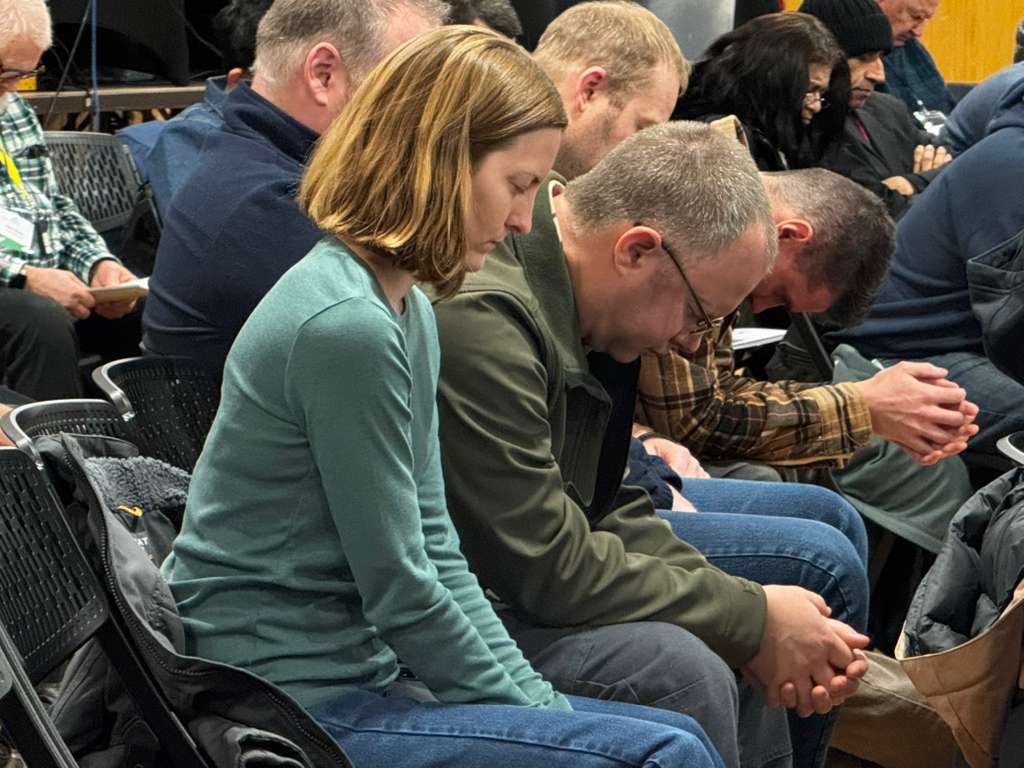 Special Constituency Session Addresses Maplewood Academy’s Financial Future
Savannah Carlson – February 22, 2026
Special Constituency Session Addresses Maplewood Academy’s Financial Future
Savannah Carlson – February 22, 2026
On Sunday, January 18, the Adventist Church in Minnesota gathered for a special constituency session to discuss the financial challenges facing Maplewood Academy. The session was called by the Minnesota Conference Board of Trustees, which met in December to set the agenda and determine the information to be shared. The primary purpose of the meeting was to provide clarity to the Minnesota Conference membership regarding the current financial status of Maplewood Academy, particularly in light of the conference’s broader financial realities. Throughout the session, intentional time was set aside for prayer, inviting the Holy Spirit’s presence and guidance as reports were presented and decisions considered. Pastor Sean Lee, who also serves as a member of the Conference Board of Trustees, reflected on the tone of the meeting, saying, “I sensed that the conference leadership made a sincere effort to be transparent and honest regarding the issue we are addressing. I am confident that God will continue to lead the Minnesota Conference in the right direction.” As part of the process, the board initiated a conference-wide survey on Adventist education, distributed to households through multiple channels including email, postcards, social media, church announcements, newsletters and bulletins. The survey provided valuable insight into how families are thinking about educational options for their children and the factors influencing those decisions. A special committee reviewed the survey results and developed a set of recommended actions. These recommendations—most of which focused on further study or strengthening existing processes—were reviewed and voted on by the board before being brought to the constituency. Among the more significant areas for consideration were the development of a plan to hire a development director and/or recruiter, and the implementation of a financial roadmap designed to provide clear benchmarks and triggers for future warnings or additional special sessions, if needed. Conference president Jeff Scoggins emphasized the importance of understanding the reality facing the academy, stating, “In my opinion, the most important part of this meeting is constituents’ clear understanding of the realities we are facing. If Maplewood must close, we can’t say we didn’t see it coming. So if we believe in the school’s mission effectiveness, then it is up to each one of us to provide both the funding and the students required to continue operating.” In addition, the Minnesota Conference Articles and Bylaws Committee recommended a change to the way the Maplewood Academy Board is structured. The proposal shifted board appointments from being elected by the constituency at large to being appointed by the Conference Board of Education. This change, which was approved by the constituency, brings the conference into alignment with recommendations from the Mid-America Union education code and allows for more strategic, mission-aligned planning for the academy. All but one of the recommended actions were approved during the session, with one minor item tabled for further review at the Minnesota Conference’s regularly scheduled constituency session on May 17, 2026. While the information presented during the meeting was weighty, the session also included meaningful reminders of Maplewood Academy’s impact and God’s past leading. Attendees were blessed by a musical performance from academy students, as well as personal testimonies from alumni, parents and others who shared how Maplewood Academy shaped their faith, their familie, and their lives. Jeremy Everhart, principal of Maplewood Academy, shared that the session was deeply encouraging. “It was truly heartening to see such a diverse group of constituents,” he said. “The vocal support we received wasn’t just encouraging; it was a powerful reminder of how deeply the Minnesota Conference cares about the future of our students. I came away from the session with a renewed sense of purpose and the clear understanding that we are all moving in the same direction to ensure our God-given mission thrives.” Pastor Keith Mosier of the Winona Seventh-day Adventist Church echoed that sense of shared commitment. He noted that many attendees arrived early to greet one another and pray together. “There was a special excitement mixed with concern,” Mosier said. “The question on everyone’s minds was what can be done to keep Maplewood Academy open. We don’t want to see this flagship institution in our conference have to close.” He added that church members who traveled long distances felt the meeting was “well worth the trip,” and left committed to continued prayer and financial support. Chad Dungan, a teacher at Minnetonka Christian Academy, reflected on the balance of realism and encouragement. “The constituency meeting was challenging because we are facing the reality of rising costs of Adventist education and dealing with serious financial issues in the Minnesota Conference,” he stated. “It was also inspiring to see hundreds of people come out to show their support for Adventist education. Our conference office team did a good job communicating the reality of the situation and promoting proper fiscal stewardship. I believe we took a positive step toward protecting Adventist education in Minnesota. As always, I am encouraged to know that the gospel will go forward in this territory because God is in charge.” Marina Johnson, an elected delegate from the Pathways Seventh-day Adventist Church, described the gathering as “uplifting, with inspiring testimonies, honest dialogue and a collective trust in God’s leading for the future of Maplewood Academy.” She added, “I hope that whatever the outcome, we will continue to trust that it is God’s plan, for His glory and in the best interest of the students, the school and the stewardship of the property.” Maplewood Academy was originally established by the Minnesota Conference constituency in the 1880s. Though it has operated under different names and in different locations over the years, it has continued uninterrupted through the faithful support of parents, alumni, members and donors. We continue to pray that God will guide and sustain this ministry to our young people. Those who feel called to support Maplewood Academy’s mission of educating students for eternity are invited to partner through prayer and, if able, financial support.
Read more...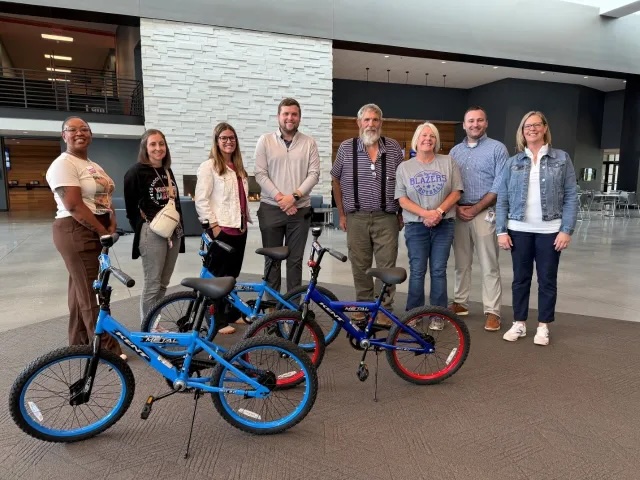 AdventHealth Leaders Unite to Build Bicycles to Benefit Local Children
AdventHealth – February 22, 2026
AdventHealth Leaders Unite to Build Bicycles to Benefit Local Children
AdventHealth – February 22, 2026
In October 2025, leaders from every AdventHealth campus in Johnson and Franklin Counties came together for a powerful day of service hosted in partnership with LEVEL 12 during their Ultimate Bike Building Program. The event resulted in the assembly and donation of 25 brand-new bicycles to children and families across the Kansas City metropolitan region. AdventHealth teams worked side-by-side to build new and name-brand bikes that would go on to support students and families through various community organizations. “As a community of leaders driven by our mission of extending the healing ministry of Christ, we selected this program to benefit our community of neighbors knowing that, for children, bikes build character and confidence,” said Dave Kennedy, MDiv, DMin, vice president of mission and ministry for AdventHealth Mid-America Region. “The newly built bicycles were donated to six local organizations, each with a unique plan to use the bikes to inspire, reward and support children.” Partner organizations included: Boone Elementary School with Center School District where bikes will be used as rewards for students who exemplify Boone’s core character traits of being respectful, responsible and safe. Indian Creek Elementary School with Center School District where bikes will be raffled during parent nights and parent-teacher conferences to encourage engagement and celebrate positive behavior. Growing Futures Early Childhood Center in Overland Park, Kansas, where bikes will be distributed during the winter break event to families with older children, alongside essential holiday support items. Child Abuse Prevention Association where bikes will be gifted to families receiving counseling services, with one bike designated as a “community bike” for shared neighborhood use. Life Spring Church and the Spring Hill SOS Event at Spring Hill School District where bikes will be given to students participating in the SOS Event, which provides school supplies, physicals, helmets and haircuts to more than 100 students annually. Shawanoe Elementary School with the Shawnee Mission School District where bikes will be raffled off during a family night and the PTA Carnival to promote school spirit and family involvement. “Every day at AdventHealth, we look for new ways to give back to the community we love and care for,” said Sondra Wallace, director of community benefit for AdventHealth Mid-America Region. “We believe that caring for the whole person – body, mind and spirit – is what matters most. Giving children the chance to feel whole by getting access to a bike, a staple of childhood, is one of many ways we are caring for them now and caring for their future.” Since 1962, AdventHealth Shawnee Mission has been proud to support initiatives that align with its mission through compassionate service, regional impact and community engagement.
Read more...
Blogs
 The Teacher’s Notes–Reconciliation and Hope, Lesson 9 Adult Bible Study Guide, 2026 1Q, "Reuniting Heaven and Earth--Christ in Philippians and Colossians"
The Teacher's Notes – February 21, 2026
The Teacher’s Notes–Reconciliation and Hope, Lesson 9 Adult Bible Study Guide, 2026 1Q, "Reuniting Heaven and Earth--Christ in Philippians and Colossians"
The Teacher's Notes – February 21, 2026
Sabbath School Lesson for February 21-27, 2026 Introduction of Lesson 9, Reconciliation and Hope Memory Text: “For he hath made him to be sin for us, who knew no sin; that we might be made the righteousness of God in him.” 2 Corinthians 5:21 Our sinless Savior, taking the sins of the whole world upon Himself and dying the death we deserve, is something we can only partly fathom and appreciate. The wonder and mystery of such a sacrifice could only be accomplished by a God of deep, matchless love. Only God could initiate and accomplish the level of reconciliation for His created beings as the cross made possible. We are so alienated from His perfection since the first sin in the Garden of Eden that we can’t be in His actual presence without being instantly destroyed. And yet, His miraculous reconciliation and transformation make it possible for His faithful ones to someday have access to His throne room and worship Him face to face. What a hope and joy we have as we wait for these awe-inspiring promises to be fulfilled in heaven and the earth made new. Outline of Lesson 9: Sunday: Reconciled From Wicked Works Monday: If You Continue in the Faith Tuesday: God’s Eternal Plan Wednesday: Mystery of God Revealed Thursday: Power of the Gospel Sunday: Reconciled From Wicked Works When we think of our worst enemies, those friends who betray us, lie about us, and do everything they can to harm us, we are describing our lost relationship with God. The course of sin and betrayal that began in the Garden of Eden has continued to alienate us from our Creator. Our lives, at their best, are totally unworthy of His love and attention. And yet, He has sacrificed Himself so we can have our relationship with Him restored. That’s how much He loves us. This reconciliation effort on His part isn’t just a simple “patch-up” of a lost friendship like we might have with our neighbors. It involves centuries of hurtful actions on the part of men and women. Our wickedness and unkind acts have hurt Him over and over; and yet, He never ceases to invite us back to His loving, waiting arms. The blood of the cross brings peace to even the most wicked among us who accept His invitation to be reconciled. Verses and questions: Colossians 1:21, 22 and Ephesians 5:27 What has the death of Christ made possible for us and all believers? Romans 5:6-11 When we have faith and repent, what does justification bring to our experience? How does the feeling of being justified affect you personally? Monday: If You Continue in the Faith Colossians 1:23 deserves attention. First of all, the Greek word “if” has several nuances. The “if” found in Colossians 1:23 seems to imply that their faith WILL continue. This makes sense when we read in Colossians 2:5 that Paul had seen the steadfastness of their faith. Although their faith was still conditional, it must have been encouraging to hear that their faith had such a strong chance for success, that it would likely continue. Then, the word “continue” brings with it the idea of persisting. This Greek word is the same one used when the scribes and Pharisees brought to Jesus a woman caught in adultery. John 8:7 says, “They continued asking Him” about the situation. Another example was when Peter “continued” knocking on the door after Rhoda left him standing there to go inside and announce his presence (Acts 12:16). This idea of our persistence is important if we are to remain faithful to God. And finally, the phrase “grounded and steadfast” is used in describing the kind of faith we need. To be grounded in our faith means for it to have a sure foundation. That foundation would be the Rock, meaning Christ Himself (1 Corinthians 10:4). Since this Rock is also known as the Word of God (John 1:14), then knowing God’s word, the Bible, is essential to the survival and grounding of our faith and love. The word “steadfast” is better understood by seeing in 1 Corinthians 15:58 that we are to be “steadfast, immovable, always abounding in the work of the Lord.” Living out the faith by our words and actions will surely keep us loving and steadfast. Verses and questions: Colossians 1:23, John 8:7, and 1 Corinthians 15:58 What are the ingredients for having a strong, lasting faith in God? What kind of encouragement must the Colossians have felt from these words in Paul’s epistle to them? Tuesday: God’s Eternal Plan As Paul languished so often in jails and later under house arrest, his pain and longing to be in the actual presence of the churches he cared so deeply for was evident. He severely missed that part of his ministry. Yet, he was willing to suffer affliction, knowing that God’s eternal plan for their salvation would continue, with or without him actually there. Indeed, God did have a plan for Paul’s life, including his times in prison. A large portion of the New Testament would be missing without his years of imprisonment. Countless generations of Christians have thus been blessed by Paul’s willingness to follow God’s plan, not his own. Colossians 1:24, 25 shows us that Paul rejoiced in knowing that he was doing everything for the sake of Christ’s body, the church. Every discouraging detail of his life had the potential to glorify God in reaching lost souls. That simple fact made him content to be where he was. Verses and questions: Colossians 1:24, 25 How, why, and for whom was Paul suffering as he wrote his epistles to the churches? How can we learn to be more content when discouraging things that happen to us? Wednesday: Mystery of God Revealed Many things about God were a mystery before Jesus came and dwelt among us. For generations, it was hard to identify with such a distant, powerful God. But, Jesus, coming in the flesh, showed us things about God that <a class="cat-post-excerpt-more" href="https://www.outlookmag.org/the-teachers-notes-reconciliation-and-hope-lesson-9/" title="Continue reading The Teacher’s Notes–Reconciliation and Hope, Lesson 9 Adult Bible Study Guide, 2026 1Q, “Reuniting Heaven and Earth–Christ in Philippians and Colossians”“>Read more…
Read more... Juicing For Health I Started Juicing and It Helps To Thrive
Jeanine Qualls – February 20, 2026
Juicing For Health I Started Juicing and It Helps To Thrive
Jeanine Qualls – February 20, 2026
https://youtube.com/shorts/fI2-gDTXQsk?si=rwj9Q406z6xChdIn
Read more... The Teacher’s Notes–The Preeminence of Christ, Lesson 8 Adult Bible Study Guide, 2026 1Q, "Uniting Heaven and Earth--Christ in Philippians and Colossians"
The Teacher's Notes – February 14, 2026
The Teacher’s Notes–The Preeminence of Christ, Lesson 8 Adult Bible Study Guide, 2026 1Q, "Uniting Heaven and Earth--Christ in Philippians and Colossians"
The Teacher's Notes – February 14, 2026
Sabbath School Lesson for February 14-20, 2026 Introduction of Lesson 8, The Preeminence of Christ Memory Text: “He [Christ] is the image of the invisible God, the firstborn over all creation. For by Him all things were created that are in heaven and that are on earth, visible and invisible, whether thrones or dominions or principalities or powers. All things were created through Him and for Him. And He is before all things, and in Him all things consist.” Colossians 1:15-17 NKJV Colossians 1:15, declaring Christ as “the image of the invisible God”, “the firstborn over all creation”, is one of the fullest and most beautiful statement about Jesus in the New Testament. Christ was both our Creator and Redeemer, conquering the powers of darkness (at creation, before sin) by allowing His kingdom of Light to shine in the darkest places imaginable (our world after sin). Christ’s preeminence means simply that He has the first place position of authority over everything. Before anything was created, He was there with the Father making it happen. His miraculous resurrection, the only one of its kind, also gives Him the first place position when it comes to dying. He was the first to achieve full victory over both life and death. The restorative and redemptive work Jesus has accomplished isn’t just for the benefit of humanity. His sovereignty includes the whole universe. The Greek word Paul uses for “world” is kosmos, a word that is understandably cosmic, extraterrestrial, in its scope and influence. Sunday: Image of the Invisible God Monday: Firstborn Over All Creation Tuesday: Head of the Body (the Church) Wednesday: The “Beginning” (and Initiator) Thursday: To Reconcile All Things Sunday: Image of the Invisible God We humans are made after God’s likeness, and in that sense, we are made in His image (Genesis 1:27). We were originally created as close to God’s nature and character as is possible for humans to be made. But of course, that image has now been largely marred by sin. Jesus, though, was the very image of God. He once told Philip that seeing Him was the same as seeing the Father (John 14:9). Another time, He said He and the Father were one (John 10:30). God’s name, as told to Moses, was “I AM”, indicating His eternal existence (Exodus 3:14). Not surprisingly, Jesus often described Himself, using God’s name. He used phrases like, “I AM the bread of life”, “I AM the light of the world”, “I AM the good shepherd”, and “I AM the resurrection, and the life”. Through His sinless, self-less words and actions we saw visible, tangible evidence of who God is. God’s divine nature shone brightly through the ministry and sacrificial death of Jesus. Verses and questions: Genesis 1:26, 27 and 2 Corinthians 3:18 In what ways do we bear God’s image, and how can that image be restored in us? Monday: Firstborn Over All Creation All the offspring of parents bear their image. Just as Adam was made in God’s image, so the sons of Adam bore their father’s likeness (Genesis 5:3). The Old Testament is full of examples though that honor one of the younger sons, treating them as “firstborn”. We must conclude that used in the biblical context, “firstborn” indicates preeminence, rather than birth order. Colossians 1:15-17 has proven difficult for many to understand. If Christ is the “firstborn”, then He must have been created–born, right? But note that the passage says “He is before all things”, once again denoting preeminence. That means He was before ALL created beings, which separates Him from those who were created. Instead, they exist because of Him. He worked side by side with the Father, making all creation possible. The phrase, “in Him all things consist” (Colossians 1:17), indicates that Jesus not only created all things, but that He is the force that holds them together, uniting them with the Father. They continue to exist because of Him. In this way, Christ is not only our Creator, but our Redeemer–restoring relationships that have been broken by sin. Verses and questions: Colossians 1:15-17 Why does Jesus deserve to be called “the firstborn over all creation”? How does the entire context here refute the argument that Jesus was a created being? Why is it important that God Himself save us from the penalty of sin, and not another created being? Tuesday: Head of the Body (the Church) Following this theme of preeminence, we find Jesus referred to as the head of all principalities and powers (Colossians 2:10). Paul illustrated this leadership position, using the example of a head in relationship to the body (Colossians 2:19). Ephesians 1 22 gets closer to identifying that “body” as the church. It says, “And He put all things under His feet, and gave Him to be head over all things to the church”. We find this idea of the church as a body when we read about the various spiritual gifts given to individual body parts in 1 Corinthians 12. We commonly refer to the leaders of countries, businesses, and just about any group, as “the head”. It’s nice to know that someone is leading out. Groups of any kind function better when someone is in charge. How thankful we can be that God has made Christ the Head of His body of believers, providing us with guidance and nourishment to make us grow and reflect His light to the world. Verses and questions: Colossians 2:10, 19 What do these verses tell us about Jesus’ position as head? Ephesians 5:23 In what ways does Christ function as Head of the church? What kind of things does He provide for the church body? Wednesday: The “Beginning” (and Initiator) Paul summed up his description of Jesus’ preeminence in Colossians 1:18. Christ is the head of the church, was at the beginning of all creation, and was the first to have total victory over death, as evidenced by His miraculous resurrection. Without this resurrection, no one would have hope of their <a class="cat-post-excerpt-more" href="https://www.outlookmag.org/the-teachers-notes-the-preeminence-of-christ-lesson-8/" title="Continue reading The Teacher’s Notes–The Preeminence of Christ, Lesson 8 Adult Bible Study Guide, 2026 1Q, “Uniting Heaven and Earth–Christ in Philippians and Colossians”“>Read more…
Read more... Re-Boost Your Metabolism Simple Steps To Re -Boost Your Metabolism
Jeanine Qualls – February 12, 2026
Re-Boost Your Metabolism Simple Steps To Re -Boost Your Metabolism
Jeanine Qualls – February 12, 2026
https://youtube.com/shorts/sP_iCr3a098?feature=share
Read more...
Featured Stories
 Entering God’s Rest: Faith, Grace and the Meaning of the Sabbath
Guest Contributor – February 23, 2026
Entering God’s Rest: Faith, Grace and the Meaning of the Sabbath
Guest Contributor – February 23, 2026
The Sabbath is not something we can shape or claim on our own terms; it is God’s gift of rest, designed in His perfect wisdom. God is too big to make a mistake, too loving to give a blessing that fails, and too wise to let us find true rest apart from His way. When we step into the Sabbath by faith, trusting His timing and guidance, we enter His peace, refreshment, and joy exactly as He intended. It is not about rules or obligation, but about receiving His rest as a gift — a sacred invitation to pause, reflect, and be renewed in the presence of the One who is perfect in all His ways. Hebrews 4 invites us into one of the most beautiful themes in all of Scripture: the promise of God’s rest. The chapter reaches back to Creation, passes through Israel’s wilderness experience, and comes forward to the present moment with a living appeal: “Let us therefore fear, lest, a promise being left us of entering into His rest, any of you should seem to come short of it” (Hebrews 4:1, KJV). This rest is not merely physical. It is spiritual, relational, and deeply personal. It is the rest of trusting God. The writer explains, “For we which have believed do enter into rest” (Hebrews 4:3). Faith is the doorway. Rest is the result. Where there is genuine trust in God’s character and Christ’s saving work, the anxious striving to secure salvation by our own performance comes to an end. Verse 10 adds, “For he that is entered into His rest, he also hath ceased from his own works, as God did from His.” This is not a call to inactivity, but a call to stop self-reliant religion and begin grace-empowered obedience. Where, then, does the Sabbath fit? Hebrews 4 does not diminish the Sabbath — it anchors it more firmly. Verse 9 states plainly, “There remaineth therefore a rest to the people of God.” The word used points directly to Sabbath rest. The weekly Sabbath still stands as God’s appointed day, a memorial of Creation and a sign of redemption. But Hebrews shows that the Sabbath is more than a calendar observance — it is meant to express an experienced reality: resting in God by faith. The Sabbath becomes most meaningful when it is kept by those who have entered heart-rest in Christ. It is not merely a pause from labor; it is a celebration of grace. We stop working not only with our hands, but with our souls. We remember that God is Creator, Redeemer, and Sanctifier — and that transformation is His work before it is ours. This harmony between faith and obedience is captured beautifully by Ellen G. White: “The Sabbath is a sign of Christ’s power to make us holy” (Desire of Ages, 288). The Sabbath is not opposed to grace — it is a sign of grace at work. It points to the One who creates, saves, and restores. True Sabbath keeping is not legalism; it is faith expressed in loyal love. In a restless age marked by pressure, performance, and spiritual uncertainty, God still speaks the invitation: enter My rest. Trust My Son. Receive My grace. Then keep My Sabbath — not as a burden, but as a delight. The Saturday weekly Sabbath is God’s gift of rest, offered in His perfect way and timing. It is a pause that belongs to Him, a sanctuary of peace He has prepared for our souls. We cannot fashion it into our own schedule or rules and expect to receive its fullness — the blessing comes when we step into it as God designed, trusting Him to guide our hearts and minds into true refreshment. By faith, we enter this sacred rest, letting go of our own striving, and discover the joy, calm, and renewal that only God can provide. It is a day not of obligation, but of invitation — a gentle, loving call from our Creator to experience His rest, His order, and His care for us. Think of your week like a fast-flowing river. The Sabbath is like a calm pool along the riverbank — a place to stop, rest, and enjoy the still water before continuing downstream. It refreshes your body, mind, and heart. As the Psalmist reminds us: “He maketh me to lie down in green pastures: he leadeth me beside the still waters. He restoreth my soul” (Psalm 23:2–3). Here is the Sabbath in action — not our striving, but God’s gift of restoration, renewing every part of us and pointing our hearts to Him. May you step into this gift of rest each Sabbath, letting God refresh your soul, and carry His peace with you into every day that follows. R. Scott Holder writes for OUTLOOK magazine on a variety of spiritual topics.
Read more... Easing the Winter Blues: Experts Share How to Restore Wholeness to Body, Mind and Spirit
AdventHealth – February 16, 2026
Easing the Winter Blues: Experts Share How to Restore Wholeness to Body, Mind and Spirit
AdventHealth – February 16, 2026
As daylight hours lessen, daylight savings time begins and schedules swell, many people may notice a dip in mood and energy. For some, those feelings go beyond the “winter blues.” Seasonal Affective Disorder, or SAD, is a form of depression linked to reduced daylight during the fall and winter months, when people’s bodies and routines shift. With awareness, simple daily choices and the right support, whole-person health can be possible throughout every season. Causes and symptoms of SAD “The exact cause of SAD isn’t fully understood and can be triggered by different factors for different people,” said Brad Sjostrom, LCSW, MAC, AdventHealth Porter’s director of behavioral health. “But shorter days mean less vitamin D production, which affects serotonin, the brain chemical that helps regulate mood.” The symptoms often mirror those of major depression, including persistent sadness, loss of interest in enjoyable activities, changes in sleep or appetite, low energy and difficulty concentrating. “While SAD occurs more often in regions with less daylight, holiday stress can heighten its impact for anyone, regardless of where they live,” he said. Healing through connection and community Social connection can also help combat the symptoms of SAD. “When you’re feeling down, it’s natural to want to stay home or keep to yourself,” said Joe Oria, licensed clinical social worker (LCSW) and AdventHealth Porter’s behavioral health clinical supervisor. “But being around people who care about you — like friends, family or even coworkers — can be one of the most beneficial ways to support mental health and start feeling better.” Cultivating mindfulness, gratitude and balance Alongside connection, mindfulness and gratitude are also meaningful ways to restore balance to the body, mind and spirit. “Start with simple, mindful practices, like journaling to nurture gratitude and grounding,” Oria said. “Writing down what you are grateful for helps shift your focus toward hope and possibility.” The holidays can bring about joy and togetherness, but that can also come with hectic schedules, high expectations and emotional strain. Both experts emphasize the importance of balance and self-care, noting that it’s perfectly okay to rest or decline an invitation. “Healthy boundaries are important for both mental health and whole-person health,” Oria said. “When we rest, we make room for practices that can bring joy and peace.” Renewing energy through light and movement In addition to setting boundaries, creating a routine centered on light can be beneficial. “Spending time outside, even for a short walk, can make a real difference,” Sjostrom said. “Light exposure, regular movement and steady sleep patterns help the body regulate mood and energy. Even something as simple as opening the blinds during the day can help.” When natural light is limited, light box therapy can signal the body to stay awake and help regulate mood and energy. Used briefly each day, these special lamps safely simulate sunlight and support the body’s natural balance. “It’s an easy, effective option that works well for many people,” Sjostrom said. “Combined with other healthy habits, this tool can help the body maintain a healthier rhythm through the darker months.” Embracing wholeness in every season Additionally, professional counseling or therapy can provide space to process emotions, strengthen mental health and build practical tools for healing; another way to nurture balance in whole-person health. “A spiritual relationship — whether through prayer, meditation or quiet reflection — can help bring peace and purpose to body, mind and spirit,” Oria said. “Faith and gratitude remind us that even in life’s darker seasons, light and hope can always be found.” SAD is a reminder of how closely the body, mind and spirit are connected. “The winter months can challenge energy and mood, but they can also remind us to slow down and care deeply for ourselves and others,” Oria said. “Whether it’s a walk in the sunshine, a moment of reflection or a conversation with someone who listens, each step toward balance can help you feel more whole.” Shelby Mulholland, media relations communications coordinator at AdventHealth
Read more... Investing in Education: NAD Women’s Ministries Scholarships
Guest Contributor – February 15, 2026
Investing in Education: NAD Women’s Ministries Scholarships
Guest Contributor – February 15, 2026
A high priority for women’s ministries is promoting the North American Division women’s ministries scholarship program, which provides vital support for young women pursuing higher education at Seventh-day Adventist colleges and universities. Eligibility requirements: Must be members of the Seventh-day Adventist Church Must be enrolled in an undergraduate program at an NAD institution Must maintain minimum GPA of 3.0 Applicants are evaluated on their commitment to the church’s mission, leadership skills, community outreach, academic achievement, and financial need Impact over the last five years: $84,000 was awarded in scholarship funds 37 recipients were supported Students from 9 Adventist universities and colleges benefited Support for this scholarship fund can be offered in two ways: by purchasing the women’s devotional book available through AdventSource (with proceeds directed to the scholarship program), or by contributing directly to the NAD Women’s Ministries Department. A call to continue the journey As we look ahead to 2026, our mission remains clear: to honor the legacy of seasoned leaders, empower the next generation, and invest in education that strengthens both faith and community. The Lord is coming soon, and we are preparing women—young and old—for ministry that reflects His love and purpose. Donna Brown is women’s ministries coordinator for the Mid-America Union. 2025 Scholarship Recipient Hi, I’m Hannah Ikpeama. I graduated with my BSN last December from Union Adventist University. I grew up in St. Louis, Missouri, attending Central Seventh-day Adventist Church and Hillcrest Seventh-day Adventist School, before moving on to Sunnydale Adventist Academy, where I discovered a love for mission work and service. I was blessed with opportunities to serve in India, at La Vida Mission in New Mexico, and through various community outreach projects that helped shape my passion for ministry. Over the past several years, I’ve served with Kids Camp and community outreach programs in Kansas City, working with refugee and inner-city families to share the love of Jesus. These experiences have shown me that even when service requires sacrifice, God always makes a way for it to remain a meaningful and consistent part of my life—something I hope to carry into my nursing career as well. During nursing school, I discovered a deep love for maternal and child health. I’m excited to begin my career in Labor & Delivery at AdventHealth Shawnee Mission and look forward to pursuing further education as God leads. I love building relationships, singing and creating meaningful memories and connections. My family, friends and everyone who has walked alongside me have played a huge role in where I am today. I feel incredibly blessed by the people God has placed in my life to encourage and support me on this journey. Most recently, He has added yet another reminder of the power of community through the generous donation I received [through the NAD women’s ministries scholarship]. I’m deeply grateful and hope to be a clear example of what your support can make possible.
Read more... Empowered Through Purpose How Adventist education transforms lives across the Rocky Mountain Conference
Guest Contributor – February 8, 2026
Empowered Through Purpose How Adventist education transforms lives across the Rocky Mountain Conference
Guest Contributor – February 8, 2026
Each year, the Mid-America Union Conference’s OUTLOOK magazine invites students from across the region to share their experiences through personal essays that reflect the heart of Adventist education. These authentic stories offer a window into how our schools shape faith, character, resilience and purpose. The following selections highlight just a few of the powerful voices from the Rocky Mountain Conference whose journeys illustrate the profound mission of Adventist education and its enduring impact on students’ lives. Across the Rocky Mountain Conference, students are experiencing Adventist education as more than academics. It is an environment that dignifies their stories, strengthens their faith, and calls them into purpose. Their voices reveal a truth we cannot ignore. When Christ is at the center, lives change. For seventh grader Harper Drane, the impact was immediate. After hearing her friend describe her experience in public school, Harper realized what she had gained. “My teachers care, and they value you and your opinion,” she shares. “They always help, no matter how busy they are.” In a world where young people often feel unseen, Harper has found belonging and guidance. At Campion Academy, Lillian Resz stepped into a spiritual transformation she didn’t expect. Leaving a public school environment that had pulled her away from church, she discovered a community that brought her back to Jesus. “I now see education as something that helps me grow spiritually and learn real things about life,” she writes. “I view devotion, prayer and my relationship with God as a gift.” Then there is Max Bicknell, whose journey from skepticism to baptism began with one unexpected moment during Week of Prayer. “I felt like a weight had been lifted off of me,” he remembers. That moment changed the trajectory of his life. “Adventist education helped me realize what I want to do with my life: lead others to Him.” And beyond the classroom, Adventist education continues shaping lives. Luca Lu, a student who entered Youth Rush carrying “fear, anxiety and depression,” found God waiting for him at the door of a stranger’s home. After a long, discouraging day, his simple prayer was answered when he met a woman who spoke his language and bought every book he carried. “It wasn’t a coincidence,” he writes. “God had prepared that door for me.” Through friendships, worship, and one powerful encounter, Luca discovered that mission is not about numbers. It is about revealing God’s love to people who need it most. These students’ stories converge into one resounding message. Adventist education empowers and shapes students’ lives through Christ-centered learning so they can influence the world and fulfill God’s eternal purpose. Supporting this mission means investing in students who are finding faith, courage, identity and hope. These lives are being transformed. Their future impact will be immeasurable. Diane Harris is education superintendent for the Rocky Mountain Conference.
Read more...

